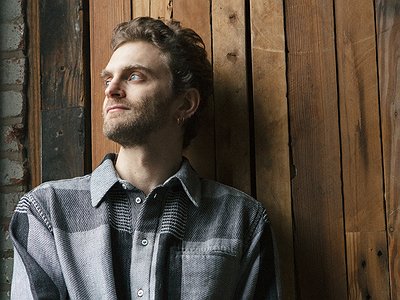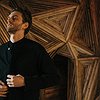Part 2
Could you take us through a day in your life, from a possible morning routine through to your work? Do you have a fixed schedule? How do music and other aspects of your life feed back into each other - do you separate them or instead try to make them blend seamlessly?
I do not have a fixed schedule at all. Some days I stay in my bathrobe for hours in the morning, cook breakfast, read the paper, do some emails - other days I get up and out early, get on my bike, and head to work (I’m currently a part-time music director at Pioneer Works in Red Hook, Brooklyn). I go to yoga, at times every day, other times once a week or once every other week - I also try to exercise at home … Intermittently, no matter what is going on, I will sit down with my music throughout the day, either at the modular, or behind the kit, or on the computer (depending on how I’m feeling or what ideas I have bouncing around in there). Sometimes I lay around and watch TV or play video games. I do really like being at home and taking it easy, considering how much time I spend on the road or out and about in the city. I also usually end up going to at least one or two shows a week, seeing friends or other people play, or playing gigs myself. I try to also meet up with friends as often as possible, and just hang out.
Here is the thing: throughout the year there are periods of being on the road, where there really is no routine besides spending a good portion of the day traveling either via automobile or airplane, sound checking, playing the gig, and then going to a hotel or something, then waking up early the next day and repeating the process, every day until the trip is over. I love being on the road, but it can be emotionally challenging and exhausting. So, when I am not on tour, I keep it flexible and enjoy my home, and I enjoy the city.
Could you describe your creative process on the basis of a piece or album that's particularly dear to you, please? Where did the ideas come from, how were they transformed in your mind, what did you start with and how do you refine these beginnings into the finished work of art?
“It's OK,” a track from my previous album, Mitral Transmission is particularly dear to me, and the process of making it and the rest of that record was particular. I started by meeting with Milford Graves, who used lab equipment to make very high-quality recordings of my heartbeat. He then used a software he had developed to convert the sound of my heartbeat into a vibrant MIDI score, which I used to compose the entirety of the record. For ‘Its OK” in particular, I started by selecting some software instruments to interpret the MIDI score - I settled on a small ensemble of pan drums and E-bowed acoustic guitars. From there, I set a few parameters of the behavior of each instrument in the virtual band, and pressed play - and the computer interpreted the music beautifully. I thought it was a particularly sweet instance of software interpreting data from a biological source. The process of mining the data and implementing it in the computer realm created something that I still find an enormous amount of emotional resonance with - this is why for me this track is one of the best things I’ve ever made - it feels like it comes right from my core when I listen to it.
There are many descriptions of the ideal state of mind for being creative. What is it like for you? What supports this ideal state of mind and what are distractions? Are there strategies to enter into this state more easily?
I think it’s important to be able to throw yourself into what you’re doing to the extent that you can lose yourself somewhat. For me, that’s where I find all of the magic creatively speaking. Being able to disappear into playing for a while almost always bears fruit of some kind artistically for me. I think it's just important to be able to open up to channeling whatever it is that’s going to pass through in that instance, and set aside whatever else might be on your mind. Sometimes, for example, I will start plugging away at my modular setup and the next thing I know five hours have passed. I try to record whenever I’m entering a state like this because otherwise things just come through and dissipate into the air. Most of the best recordings I've made have happened in this kind of state, where I find myself swaying in a trance to something that’s emerged in front of me that I generated through some combination of gestures, and then I snap out of it and go “Oh shit this is good… Am I recording?” The only way I can hold on to inspiration or the channeled information is to record so that I can revisit the idea later, or build on it.
With drumming it is quite the same, although in some ways the recording mechanism is taking place in muscle memory, so it is a lot easier to recall what comes up, especially if I'm repeating it enough. But it requires the same melding into the playing of the instrument to be able to get to that hypnagogic place, where the really valuable stuff oozes out from - then you just have to hope you’re paying attention enough or are recording. Some of these hypnagogic harvests have taken place over the course of years of collective sitting at the drum set, where slowly a pattern reveals itself and seeps into my muscle memory so I can activate it willingly. A big one started working its way through me in 2012 or so and solidified in about 2014 - I’m still deeply engaged in working it out and figuring out all the possibilities that it presented rhythmically.
How is playing live and writing music in the studio connected? What do you achieve and draw from each experience personally? How do you see the relationship between improvisation and composition in this regard?
I think, again, I answered this above - for me ideally there is not a lot of difference between the two … Some music requires an emphasis on flawless execution, and in those cases, it's about “nailing it” - otherwise it's about getting to that place where things flow and then just make sure you’re recording! The track “By Virtue of Emptiness” on my new album is an excellent example of this. It just happened. We were in the studio, and Eli started recording, and I played the whole thing in one take. Then we invited Maria and Michael to play on the track, and again, one take each, we had it. Sometimes you just step into this cloud of mind body connection and everything works. I'm always trying to figure out more about how to activate this willingly. It seems like it just strikes sometimes, and luckily in an opportune fashion a lot of the time.
How do you see the relationship between the 'sound' aspects of music and the 'composition' aspects? How do you work with sound and timbre to meet certain production ideas and in which way can certain sounds already take on compositional qualities?
I just try to make things that feel good to me. I can’t go into the specifics. It's almost entirely intuitive at this point. Ask me again in a year or two; I might have a better answer.
Our sense of hearing shares intriguing connections to other senses. From your experience, what are some of the most inspiring overlaps between different senses - and what do they tell us about the way our senses work? What happens to sound at its outermost borders?
I have a lot of overlap between hearing and seeing. When I was making The Gradual Progression I saw a lot of the music. The closer I got to feeling ready to record, the more I saw the music in each piece as a virtual environment that I was interacting with, with different objects therein that I was animating via gesture on the drum set. I have this experience sometimes with other people’s music as well, although less often … Alice Coltrane's “Shiva-Loka” does this to me intensely - I always see a pond, with a crane, and other animals. The music seems to me to be the expression of these animals in this environment. It’s weird, and I don’t think that's at all intended in the music, but it’s just where I go when I hear it.
Art can be a purpose in its own right, but it can also directly feed back into everyday life, take on a social and political role and lead to more engagement. Can you describe your approach to art and being an artist?
I’m mostly just trying to survive and do fourteen million things at once, which is a struggle. I do though have a through line of motivation that connects all the work, and it feels like I’m trying to be free. And I’m trying to do The Work, literally all the time. And, I think, the more I stay engaged with this Work, the more I can be of service to other people, musically and otherwise. It's definitely a time where I feel it is important for musicians and artists to engage socially and politically … I’m always looking for new ways to plug in along these lines, and to combine the thoughts and ideas and the creativity.
It is remarkable, in a way, that we have arrived in the 21st century with the basic concept of music still intact. Do you have a vision of music, an idea of what music could be beyond its current form?
It's just drumming. Forever. I don’t think that will ever change, so long as we have hearts beating in our chests.
I'd like to see a better economic model for musicians. Things are tough out there right now unless you're mega famous, getting scoring gigs, or someone is licensing your music. I want to find a balance where I can pursue my music and also enjoy more of the things I want to do in life. I can't achieve my dream of having a thriving garden if I have to be on the road for half of the year.
I made an impression when I was growing up in NYC of a particular kind of vibrant nightlife that I hope we can return to or revitalize - wherein music of all sorts coexist in spaces that bring seemingly disparate communities of people together. Only good could come of that. Things seem a bit fragmented and niched now.






